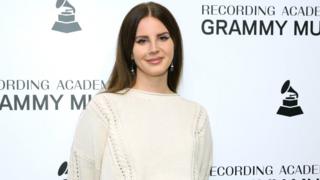Lana Del Rey: ‘I’m not glamorising abuse’
Lana #Lana

 Image copyright Getty Images Image caption The star said she had been “honest and optimistic” about her bad relationships
Image copyright Getty Images Image caption The star said she had been “honest and optimistic” about her bad relationships
Lana Del Rey has defended herself against accusations that her lyrics are anti-feminist.
Writing on Instagram, the star criticised “female writers” who have attacked her for “glamorising abuse”.
She said her lyrics often talked about “the realities” of emotionally abusive relationships, and argued there should be a place for those topics in music.
“I’ve been honest about the challenging relationships I’ve had,” she said. “That’s just how it is for many women.”
“I think it’s pathetic that my minor lyrical exploration detailing my sometimes submissive or passive roles in my relationships has often made people say I’ve set women back hundreds of years.
“There has to be a place in feminism for women who look and act like me,” she continued.
“The kind of woman who says no but men hear yes; the kind of women who are slated mercilessly for being their authentic, delicate selves; the kind of women who get their own stories and voices taken away from them by stronger women or by men who hate women.”
Del Rey also called out double standards, noting that stars like Ariana Grande, Cardi B and Beyonce could sing about “being sexy, wearing no clothes [and] cheating” without facing criticism.
Del Rey’s lyrics have frequently addressed unhealthy relationships, and being seduced by controlling or foreboding characters.
Her break-out hit and signature song, Video Games, described a lover who was distant and dismissive, but for whom she professed undying love.
Later songs followed a similar theme. “My old man is a bad man,” she sang on Off To The Races; while her boyfriend on Ultraviolence “used to call me DN – that stood for deadly nightshade, because I was filled with poison”.
In recent years, the singer has distanced herself from some of her earlier lyrics, and even removed a song called Cola from her live show because of its references to a Harvey Weinstein-like figure.
Speaking to Pitchfork in 2017, she recoiled at the mention of the line “he hit me and it felt like a kiss”, also from the track Ultraviolence.
“I don’t like it. I don’t sing that line any more,” she said.
“Having someone be aggressive in a relationship was the only relationship I knew. I’m not going to say that that [lyric] was 100% true, but I do feel comfortable saying what I was used to was a difficult, tumultuous relationship, and it wasn’t because of me. It didn’t come from my end.”
Nonetheless, accusations of glamorising abuse have continued to haunt the singer.
A typical criticism came from journalist Isbella Castillo, who wrote an essay saying Del Rey’s music was “full of outdated, anti-feminist ideas”.
“Whether it was her intention or not, romanticising domestic abuse is dangerous territory when you have an audience of young, impressionable listeners, or any listeners at all for that matter,” she wrote.
Others took a more sympathetic view – with music critic Lindsay Zoladz arguing Del Rey’s portrayal of a woman who stumbled, fell and picked herself up again was a more realistic alternative to “empowerment as the default aspiration of the pop star”.
In her Instagram essay, Del Rey picked up this theme, insisting she was writing “about the realities of what we are all now seeing are very prevalent emotionally abusive relationships all over the world”.
Image copyright Getty Images Image caption The singer also announced a new album, due out on 5 September
She added that her success had given other women the freedom not to sing about being happy,” and to just be able to say whatever the hell they wanted to in their music – unlike my experience where, if I even expressed a note of sadness in my first two records, I was deemed literally hysterical as though it was literally the 1920s”.
Closing her statement, the star said she’d be exploring these themes further in two forthcoming books of poetry; and announced a new album, due on 5 September.
That record will be the follow-up to 2019’s Norman [Expletive] Rockwell, which was nominated for album of the year at the Grammys, and topped the BBC’s “poll of polls” for the best-reviewed record of 2019.
Follow us on Facebook, or on Twitter @BBCNewsEnts. If you have a story suggestion email entertainment.news@bbc.co.uk.